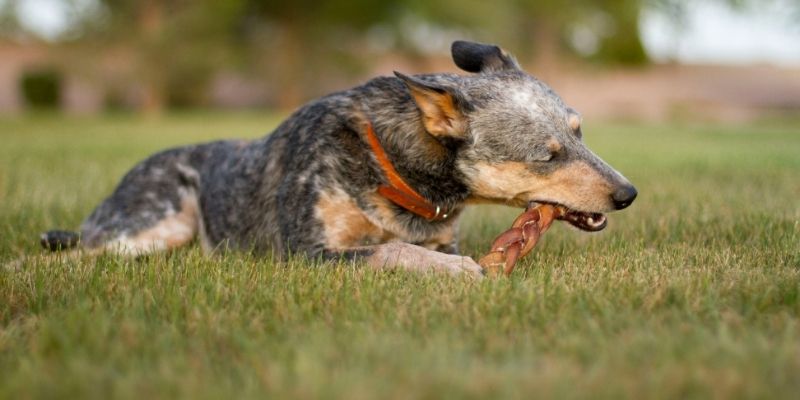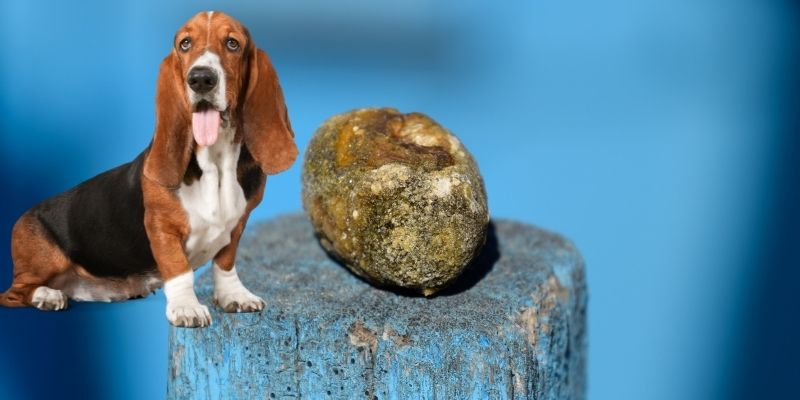A pet dog needs much care and attention, and you have to be relatively intuitive when dealing with its health problems. If you are witnessing sudden changes in your dog’s urinary behavior, it might be a sign of bladder stones. Before jumping into understanding what food causes bladder stones in dogs, you need to be aware of the symptoms of such a disorder in dogs.
These symptoms include accidental urination, discoloration in urine, painful urination, regular attempts at urinating without production, and discomfort around the urinary opening suggested by their frequent licking of that region. Since urinary tract infections and stones are more prevalent in cats and dogs than humans, this is a disorder that you must be particularly aware of.
Do you have a specific question about what food causes bladder stones in dogs? Then use the table of contents below to jump to the most relevant section. And you can always go back by clicking on the black arrow in the right bottom corner of the page. Also, please note that some of the links in this article may be affiliate links. For more details, check the Disclosure section at the bottom of the page.
Here's what we'll cover:
- Does my dog have a urinary problem or bladder stones?
- What Is a Bladder Stone Made Of?
- How did my dog get these stones, and why are these dangerous?
- What food causes bladder stones in dogs?
- Water Intake and bladder stones
- Be Careful with Added Ingredients
- Dietary treatment of bladder stones
- Best foods for Dogs with Bladder Stones
Does my dog have a urinary problem or bladder stones?
To understand whether your dog has a bladder stone or a urinary problem, you have to be wise about the clinical signs and symptoms associated with this disorder. The most frequent signs of bladder stones are hematuria and dysuria. Haematuria is blood in urine, while dysuria is the experience of pain or difficulty when urinating.
When the stones rub against the bladder’s walls, it leads to hematuria. At the same time, dysuria is commonly associated with inflammation around the urethra or bladder wall. Stones cause an obstruction, and if it is large enough, it can be life-threatening for your dog. For this reason, you should be aware of what food causes bladder stones to avoid these as much as possible.
What Is a Bladder Stone Made Of?
Bladder stones can be of various types in your dog, which are as follows:
Struvite is described as a hard mineral deposit caused by the deposition of magnesium and phosphate. Struvite stones generally form when the urine is infected with ammonium-producing bacteria, which raises the pH leading to Struvite crystals coming together and forming a stone.
Calcium oxalate stones are formed when your dog’s urine is over-saturated with calcium and oxalate. These are the most difficult stones to prevent since sufficient data is not public yet.
These stones can be managed with medical interventions and a specific diet for bladder stones.
How did my dog get these stones, and why are these dangerous?
According to the precipitation crystallization theory, when stone-forming crystalline compounds are elevated in the urine, stone formation may take place. This can be a cause of inadequate diet or previous bladder disease. It might also be linked to your dog’s metabolic system.
How saturated these compounds get in your dog’s body depends on the acidity of urine. When it cannot be held any longer, the residue forms crystals known as stones. For this reason, you must make sure to include dog food to prevent bladder stones in the diet.
While stones are generally associated with dysuria or hematuria, they might get larger if not treated. Big rocks act like valves or obstructions in the urinary system. This might ultimately cause a ruptured bladder, being quite fatal for your dog.
If the problem becomes big enough, it can even lead to death. Make sure to keep a note of the food that causes bladder stones to prevent this problem from happening in the first place.
What food causes bladder stones in dogs?
Foods high in oxalates such as sweet potato, organ meat, brown rice, and spinach should be avoided to prevent oxalate stones. Understanding bladder stones in dogs diet helps eliminate food that may lead to the formation of dark or white stones. You can reduce the intake of food that is high in purine or struvites and oxalates.
Water Intake and bladder stones
One of the most frequent strategies utilized by vets is to keep the animal well hydrated to prevent bladder stones. Diluting urine by increasing the water intake is one of the best ways to fight bladder stones.
Suppose your dog is not particularly keen about drinking water. In that case, you can provide them with a high moisture diet or by making the process of drinking water a little more exciting by adding water fountains or adding flavor to water.
Be Careful with Added Ingredients

Know what food causes bladder stones and be very mindful about your dog’s diet. Stick closely to what your vet suggests when it comes to keeping your dog’s diet free from bladder stone causing substances.
As a general rule of thumb, try to avoid food such as pig ears, rawhide, bully sticks, and other collagen-rich foods. Not only are they particularly dehydrating, but they also contain compounds that can be easily converted to calcium oxalate stones.
If your dog already had previous stones keep them away from foods high in calcium like dairy products or oxalates like spinach. In the case of cystine or urate stones, seafood and protein-rich treats should be avoided.
Dietary treatment of bladder stones
Close monitoring is of utmost importance for the dog’s bladder stones diet. In most cases, the most common strategy is to increase the dogs’ water intake to dilute the urine and prevent the consumption of high in stone-forming compounds. Restricting the intake of calcium, oxalate, phosphorus, and protein-rich foods is one of the best dog bladder stones home remedies.
Best foods for Dogs with Bladder Stones
For cysteine and urate stones, a diet for dogs usually consists of low-protein food. Dog food for bladder stones includes food with moderate levels of protein, calcium, and phosphorus.
Plus, it has a good amount of fiber, in case of calcium oxalate stones. Water-rich foods are usually prescribed. It is more about avoiding certain foods and preparing the right homemade dog food bladder stones.
Once you understand what food causes bladder stones, you start mindfully altering the diet for best results. Be empathetic with the pet’s needs and consult your vet as required.
Thanks for the blog graphics: Canva.com

Thanks for the blog graphics: Canva.com
Doghint.com is a participant of several affiliate programs. The list includes (but not limited to) the following: VigLink, Refersion, ShareASale, and Amazon Services LLC Associates Program, an affiliate advertising program designed to provide a mean for us to earn fees by linking to Amazon.com and affiliated sites. Doghint.com does not intend to provide veterinary advice. All published articles are meant for informational purposes only and not substitute the professional veterinary consultation.


